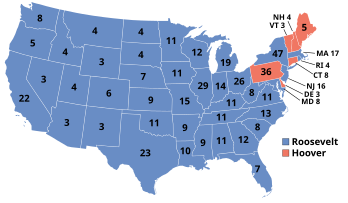1932 United States elections
[4] The Democratic Party swept control of the White House and both chambers of Congress, ending 72 years of Republican dominance of the country that lasted since 1860 and Lincoln's presidency.
Roosevelt's victory was the first by a Democratic candidate since Woodrow Wilson won re-election in 1916.
Roosevelt took his party's nomination on the fourth ballot, defeating 1928 nominee Al Smith and Speaker of the House John Nance Garner.
In addition to Hoover's defeat, the Republicans also suffered crushing defeats in both congressional chambers: they lost 101 seats in the House of Representatives, with the Democrats expanding their House majority to a supermajority, and also lost twelve seats in the Senate,[3] with Democrats winning control of the chamber for the first time since 1918.
The Reapportionment Act of 1929 provided a permanent method of apportioning 435 House seats; previously, Congress had had to pass apportionment legislation after each census.

